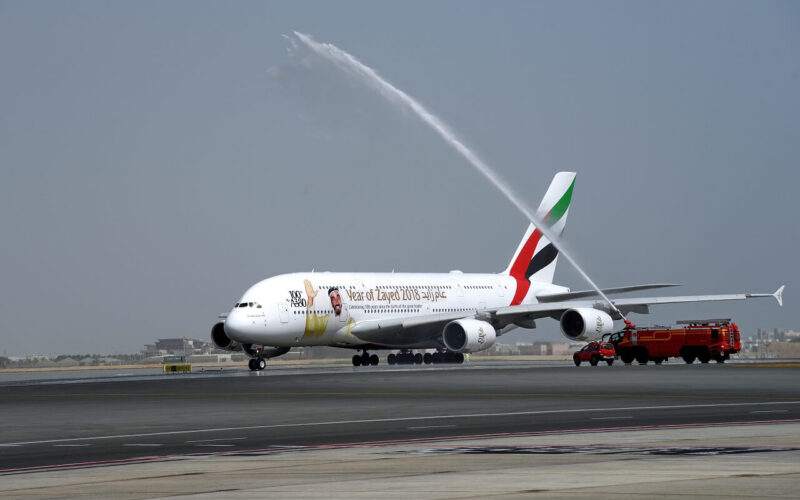As Airbus prepares for the end of the A380 and airlines around the world gradually phase out their last superjumbos, Emirates shows no stopping when it comes to showcasing its flagship aircraft. This time – by launching the world’s shortest superjumbo route. On July 1, 2019, the airline inaugurated regular A380 service between Dubai (UAE) and Muscat (Oman): a journey that covers 340 km (211 miles) each way and takes only around 44 minutes.
Starting July 1, 2019, Emirates will operate twice-daily A380 services (flights EK862/863 and EK 864/865) between Dubai International Airport (DXB) and Muscat International Airport (MCT), the airline announced on May 30, 2019.
The inaugural A380 flight to Muscat (EK862) took off from Dubai International at 8:51 AM on the morning of July 1, landing in Muscat only 41 minutes later. The flight spanned 349 km (217 miles), reaching an altitude of 19,000 feet (5,791 km).
This morning’s @emirates #EK862 inaugurated regular A380 service between Dubai and Muscat, making the 349km journey the world’s #ShortestA380Flight. The 41 minute flight reached a maximum altitude of 19,000 feet. See playback at https://t.co/bnmUGDTkQn pic.twitter.com/r84gM1Dt0B
— Flightradar24 (@flightradar24) July 1, 2019
Emirates celebrated the launch of the service with a series of Tweets, sharing interesting facts and figures about its superjumbo.
Emirates has carried 150,000 tons of cargo between Dubai and Muscat since 2008. That’s equal to the weight of 260 @Airbus A380s. #ShortestA380Flight #FlyEmiratesFlyBetter pic.twitter.com/hm6oQzJX00
— Emirates Airline (@emirates) July 1, 2019
Emirates has flown over 4.7 million customers between Dubai and Muscat since 1993. That’s the capacity of nearly 9,000 Emirates @Airbus A380s. #ShortestA380Flight #FlyEmiratesFlyBetter pic.twitter.com/a503FmuLHJ
— Emirates Airline (@emirates) July 1, 2019
The A380 Dubai-Muscat services is the shortest route in Emirates’s network and breaks the airline’s own record.
Until 2017, Emirates had operated the world’s shortest scheduled A380 service between Dubai and Doha, The Statesman points out. In 2018, the title of the world shortest A380 route went to Emirates Dubai – Kuwait International Airport (KWI) route, with the distance of 854 km (531 miles) that is now being covered by the airline’s Boeing 777s.
And prior to the launch of flights to Muscat, the shortest Emirates superjumbo flight had been to King Abdulaziz International Airport (JED) in Jeddah, Saudi Arabia, spanning 1,669 km (1,055 miles). In contrast, the longest Emirates A380 flight is its non-stop Dubai – Auckland Airport (AKL), New Zealand, route, covering the distance of 14,193 km (8,819 miles) and taking around 15 hours to complete.
The launch of the A380 service comes exactly one year after an Emirates’ superjumbo performed a one-off scheduled flight at the recently opened Muscat International. The flight, which took place on July 1, 2018, marked 25 years of the airline’s operations to Oman, but it also was meant to examine the airport’s infrastructure readiness to handle A380 operations, Emirates stated at the time.
Emirates started flying to Muscat back in 1993, operating a Boeing 777-200 four times a week. Until now, the carrier operated three daily services between the two cities utilizing 777-300ER aircraft.
Emirates’s fleet analysis
In August 2018, the Gulf carrier celebrated 10 years of its A380 operations and remains the world’s largest operator of the A380. The airline continues to add A380 services, most recently by adding flights to Amman (Jordan) and Boston (U.S.).
However, earlier this year, in February 2019, Emirates decided to put the brakes on orders of its beloved aircraft, cancelling 39 A380s and leaving only 14 in Airbus’ backlog, which are to be delivered by the end of 2021.
The carrier also scrapped its order for 20 superjumbos and signed a deal for 40 of the latest-generation A330s and 30 A350s instead. As a consequence of Emirates’ decision, Airbus announced that it will cease production of the iconic double-decker in 2021.
Commenting on the situation, Sheikh Ahmed bin Saeed Al Maktoum, Emirates airline and Group chairman and chief executive, said:
“Emirates has been a staunch supporter of the A380 since its very inception. While we are disappointed to have to give up our order, and sad that the program could not be sustained, we accept that this is the reality of the situation. For us, the A380 is a wonderful aircraft loved by our customers and our crew. It is a differentiator for Emirates”.
He also assured the A380 „will remain a pillar” of the carrier‘s fleet „well into the 2030s” at the time.
According to Airbus orders and deliveries log for the month of May 2019, the Dubai-based carrier currently operates 110 A380s. Another 13 superjumbos are yet to be delivered, Emirates states on its official website.
Aside of the A380, the airline also operates 133 Boeing 777 aircraft (including 777-200, 777-200LR, 777-200ER and 777-300ER variants), Boeing orders and deliveries book shows. An order for 150 of the upcoming 777X airplanes, placed back in 2014, remains unfilled to this day.

